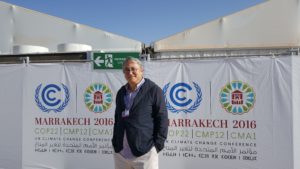Professor Ricardo García Mira is Professor of Social and Environmental Psychology at the University of A Coruña in Spain, and Visiting Professor at the IPR.
Last October the requirement that enabled the Paris Agreement (adopted in December 2015 by 195 countries) to come into force was met; 55 countries who together account for a minimum of 55% of global greenhouse gas (GHG) emissions formally accepted the Agreement, which came into force a month later. By the close of the United Nations Climate Change Conference (COP22) held in Marrakech last month, 111 countries had already ratified the Agreement, accounting between them for over three-quarters of global emissions. The Agreement has been one of the quickest to come into force as an international treaty for a global agreement.
The uncertainty generated when delegates became aware, partway through COP22, that Donald Trump had won the US election and would be the next President of the United States did not stop over 200 different countries from signing the Marrakech Action Proclamation with the highest level of political commitment to combatting climate change and reducing its impact. The Proclamation will not be immediately binding on the parties, but will serve as a guide for designing political action towards the drawing up of a regulatory text that will enable the practical application of the Paris Agreement.
A moment of transition
Despite the uncertainties hovering over Marrakech due to Trump’s election victory and his previous criticisms of climate change, the assembled heads of state fixed a deadline of 2018 for the application of the rules in the Agreement. COP22 also led to a better understanding of the numerous questions involved in designing a framework within which the commitments of the Paris Agreement could be fulfilled, defining the areas of convergence and divergence between countries, and adopting a work plan (The Paris Rulebook). The Rulebook covers a wide range of topics, including mitigation, adaptation, finance and transparency, together with a delineation of tools including a new ‘global inventory’ process, market mechanisms and guidelines for the application and fulfilment of commitments based on which definitive decisions will be taken in 2018, when the Intergovernmental Panel on Climate Change (IPCC), the UN’s group of experts, will advance its new report on the effects of climate change and increasing temperatures.
The Prime Minister of Morocco declared that it was an extraordinary occasion, and that there is now no going back on this moment of transition towards an earnest and unified struggle against climate change. Other cities, states and NGOs in Africa, China, Europe and Latin America, among others, declared their concurrence with these sentiments through their heads of government and ministers – including US Secretary of State John Kerry.
The plans in the Paris Agreement include aid for developing states from developed countries to promote the implementation of policies for adapting to climate change and the assignation of specific mitigation funds to eradicate sources of greenhouse gas.

COP22, which brought together over 500 politicians, business people, NGOs and civilians in Marrakech, urged Trump to act for the benefit of the planet, and called for his collaboration. Trump’s leadership, however, is not so critical if we take into account the fact that the struggle against climate change is already being configured as a matter of social responsibility all over the planet, and has already started to generate elements of social identity and socio-political involvement around it. Added to this is the commitment and organisation of municipalities, cities and regions of the world into forums and associations which reinforce this social identification on a local level. Furthermore, China and the European Union are already fighting for the leading position in the struggle against climate change, just in case the United States resigns from this mission. China, for example, has not budged from its commitment to the Paris Agreement, and will keep on fighting against global warming. Political commitment to this cause is real.
Matters still to resolve
Adaptation to and mitigation of the impacts of climate change will require additional funds, especially for developing countries. Hence, despite a high level of consensus between countries, there are certain matters which will need resolving over the next two years; we must reach an agreement to define the climate change adaptation fund, for example, which has been suspended again and will require further negotiations. Another outstanding issue is the Green Climate Fund, which will require more financing.
Climate change exists and is very serious, and people are the main cause. This is stated in the 5th IPCC Report. It is therefore urgent to drastically reduce CO2 emission so that we do not exceed the 2 degrees centigrade threshold, which would be a serious threat to the planet’s stability. The central challenge lies in establishing a real commitment to a green economy, and assessing the positive and negative aspects of applying techniques like geoengineering and bioengineering, which could help establish one.
Finally, scientists as a whole must bear responsibility for the way in which we deal with and supply knowledge to decision-makers in the struggle against climate change. Like the mass media, we also must resist the pressure of powerful lobbying by both large companies and governments that use the results from our reports to pursue their own interests. Furthermore, we can all see – and should greet with concern – the ready flow of money to deniers and sceptics of climate change that facilitates them in discrediting the results of painstaking scientific work.
Commitments underway
Some initiatives towards addressing these challenges are already underway, including Cross-border Cooperation in the Mediterranean (a 5+5 Water Initiative), and others related to energy. The International Civil Aviation Organization is creating a device to reduce CO2 emissions from planes. 48 countries in the Climate Vulnerable Forum undertook to maintain their systems in such a way that global temperature increase will be no more than 1.5 degrees centigrade, and to promote measures to achieve a 100% renewable electricity supply, in the short or medium term. Germany, the United Kingdom and Canada, among others, have announced their target of reducing CO2 by 80% in 2050. The European Union has made a similar statement, although some countries have not evidenced a clear strategy in other aspects, such as phasing out coal.
Trump’s electoral victory did not, therefore, prevent some of the most vulnerable countries from undertaking serious commitments to reduce emissions, transform their traditional energy systems into renewable energy production, and move towards eco-friendly systems in energy management.
Over the next two years, the technical agreements reached in Marrakech will lead to policies, protocols and financial and transparency procedures which, in turn, will provide the framework for moving from commitment to implementation between now and 2050. Signatories will be committed to drawing up the necessary regulatory architecture to implement political action; complying with the ordinances laid out in the Agreement all over the planet; and driving efficient adaptation to climate change, promoting more sustainable lifestyles which depend less on carbon. In their national industries, they will be expected to establish an eco-friendly framework in energy management, including the residential sector; to promote a sustainable mobility and transport policy; and to fix specific reduction targets for each of the main sectors in greenhouse gas emission, in the short, medium and long term (2020, 2030 and 2050). Their commitments to finance and transparency will include promoting and implementing national policies tending towards the reduction of CO2 emission in all sectors of the economy, and the tools for complying with them; guaranteeing an information management system that is free and which can be publicly accessed; and undertaking appropriate financing to be able to reach these targets.
Marrakech as a tipping point
Implementing these policies effectively will also require combining them in such a way that they are more efficient in terms of mitigation, given the transversal nature of the way the struggle against climate change should be deployed. Far from being dulled by Trump’s victory, Marrakech can be seen as a “tipping point”, a marker of the moment when the idea of the struggle against climate change became an irreversible social trend, spreading out over the whole planet as if it were a forest fire.
Respond




